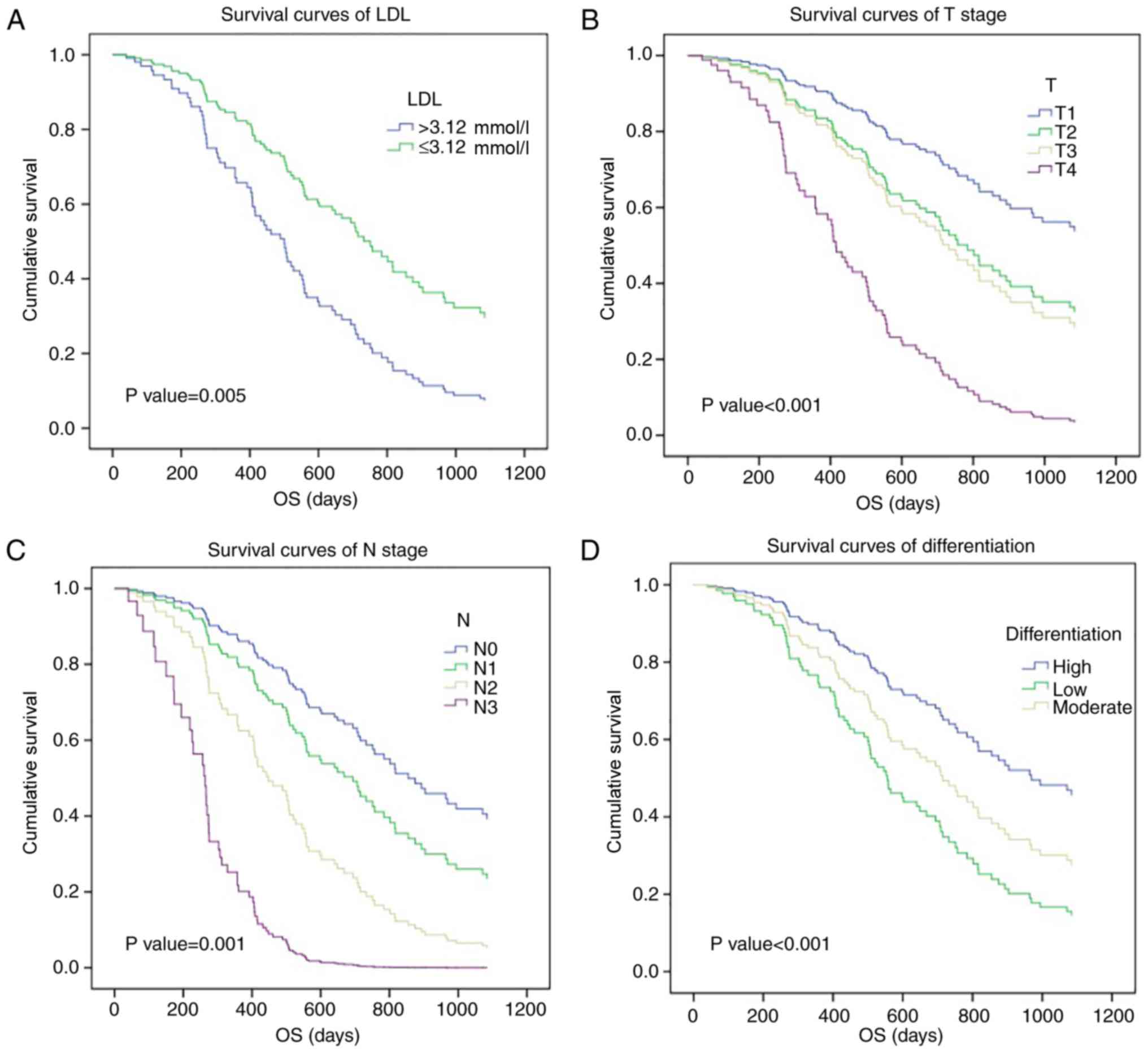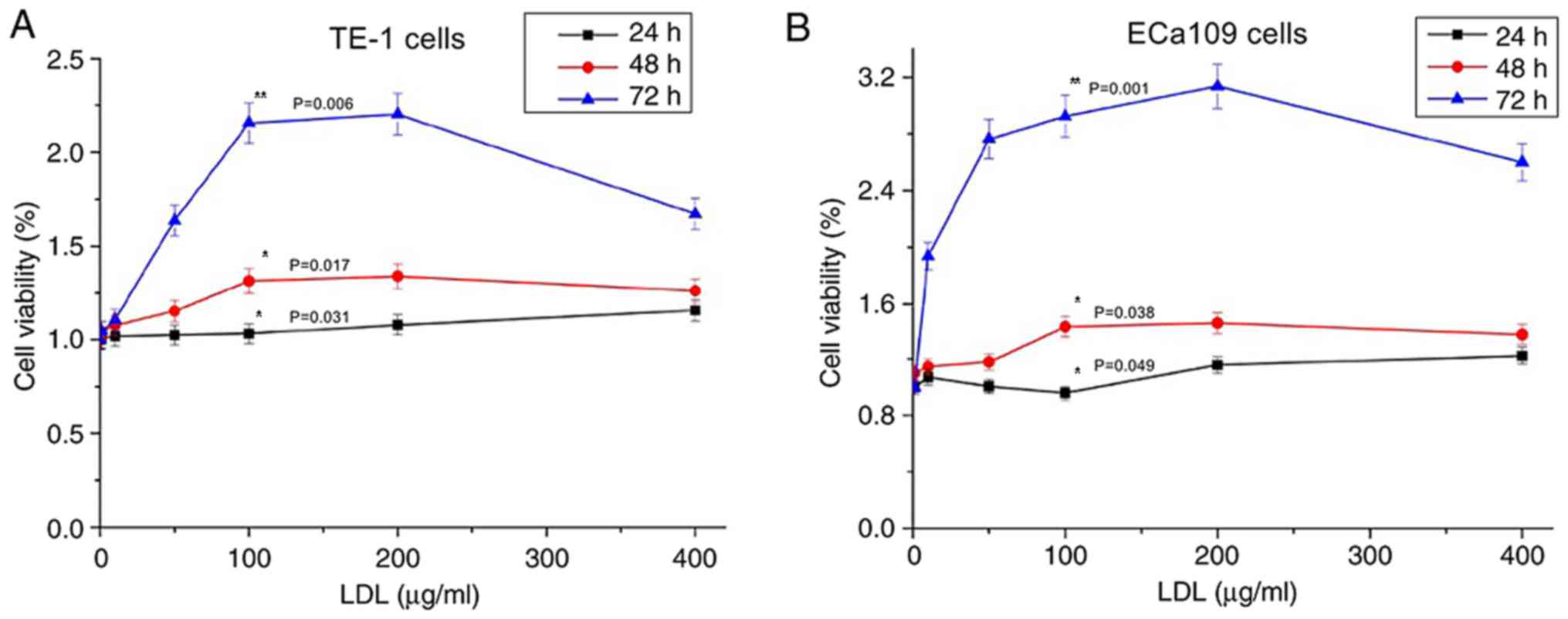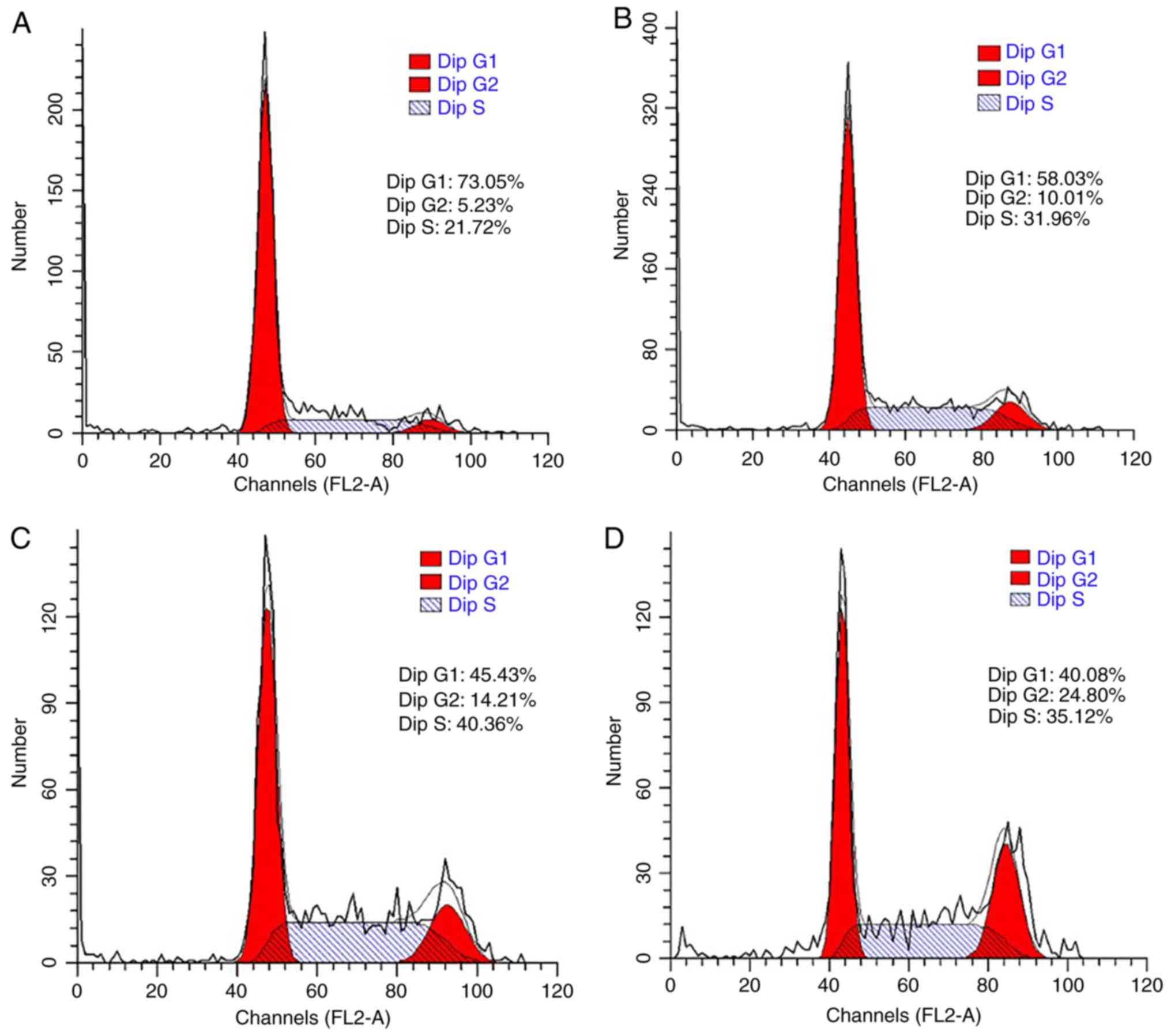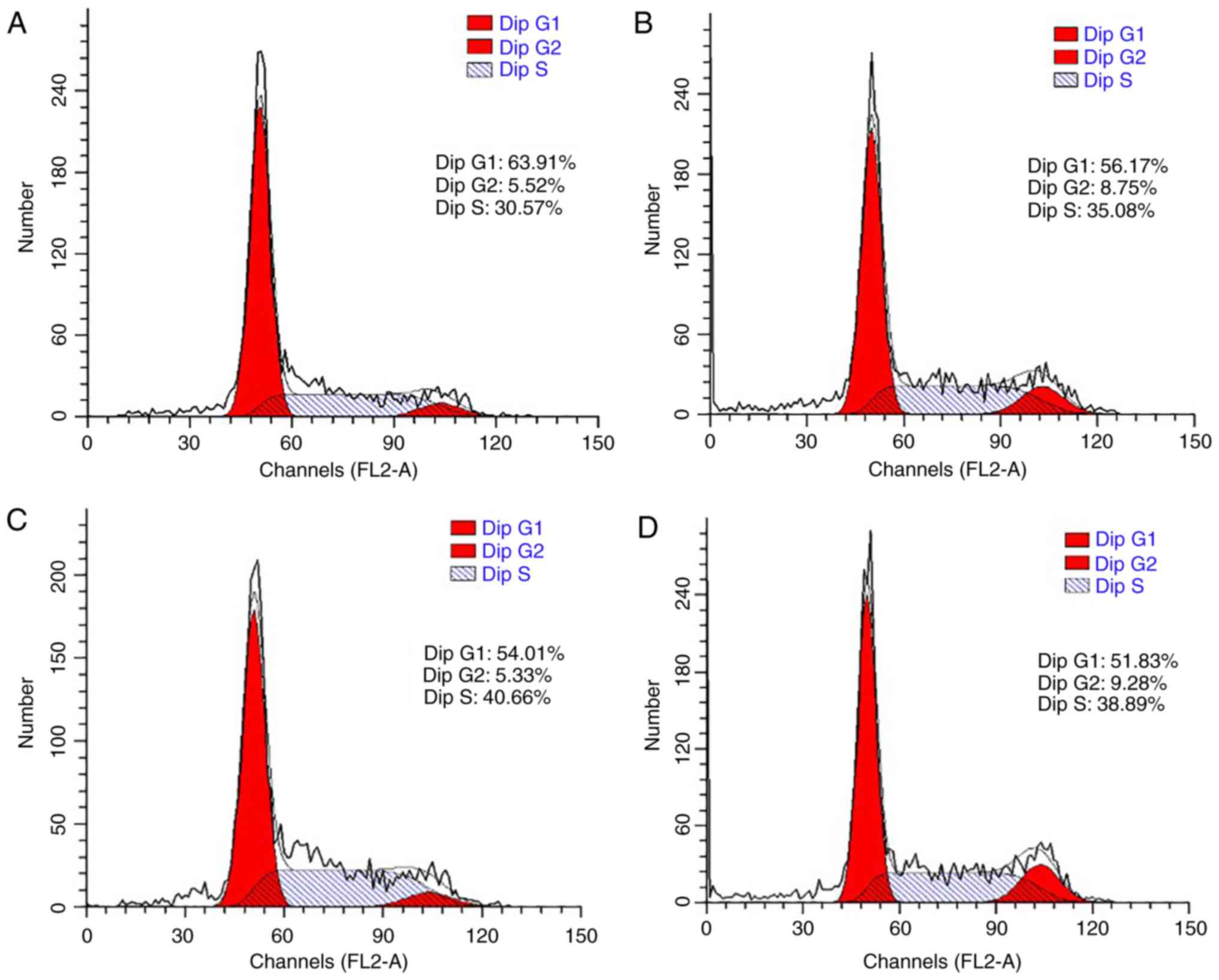|
1
|
Pennathur A, Gibson MK, Jobe BA and
Luketich JD: Oesophageal carcinoma. Lancet. 381:400–412. 2013.
View Article : Google Scholar : PubMed/NCBI
|
|
2
|
Rustgi AK and El-Serag HB: Esophageal
carcinoma. N Engl J Med. 371:2499–2509. 2014. View Article : Google Scholar : PubMed/NCBI
|
|
3
|
Tran GD, Sun XD, Abnet CC, Fan JH, Dawsey
SM, Dong ZW, Mark SD, Qiao YL and Taylor PR: Prospective study of
risk factors for esophageal and gastric cancers in the Linxian
general population trial cohort in China. Int J Cancer.
113:456–463. 2005. View Article : Google Scholar : PubMed/NCBI
|
|
4
|
Van Hagen P, Hulshof MC, van Lanschot JJ,
Steyerberg EW, van Berge Henegouwen MI, Wijnhoven BP, Richel DJ,
Nieuwenhuijzen GA, Hospers GA, Bonenkamp JJ, et al: Preoperative
chemoradiotherapy for esophageal or junctional cancer. N Engl J
Med. 366:2074–2084. 2012. View Article : Google Scholar : PubMed/NCBI
|
|
5
|
Zheng X, Xing S, Liu XM, Liu W, Liu D, Chi
PD, Chen H, Dai SQ, Zhong Q, Zeng MS, et al: Establishment of using
serum YKL-40 and SCCA in combination for the diagnosis of patients
with esophageal squamous cell carcinoma. BMC Cancer. 14:4902014.
View Article : Google Scholar : PubMed/NCBI
|
|
6
|
Cao HH, Zhang SY, Shen JH, Wu ZY, Wu JY,
Wang SH, Li EM and Xu LY: A three-protein signature and clinical
outcome in esophageal squamous cell carcinoma. Oncotarget.
6:5435–5448. 2015. View Article : Google Scholar : PubMed/NCBI
|
|
7
|
Chen GQ, Tian H, Yue WM, Li L, Li SH, Qi
L, Gao C, Si LB and Lu M: NCOA5 low expression correlates with
survival in esophageal squamous cell carcinoma. Med Oncol.
31:3762014. View Article : Google Scholar : PubMed/NCBI
|
|
8
|
Gupta A, Das A, Majumder K, Arora N, Mayo
HG, Singh PP, Beg MS and Singh S: Obesity is independently
associated with increased risk of hepatocellular cancer-related
mortality: A systematic review and meta-analysis. Am J Clin Oncol.
49:874–881. 2018. View Article : Google Scholar
|
|
9
|
Chang SJ, Hou MF, Tsai SM, Wu SH, Hou LA,
Ma H, Shann TY, Wu SH and Tsai LY: The association between lipid
profiles and breast cancer among Taiwanese women. Clin Chem Lab
Med. 45:1219–1223. 2007. View Article : Google Scholar : PubMed/NCBI
|
|
10
|
Zhang X, Zhao XW, Liu DB, Han CZ, Du LL,
Jing JX and Wang Y: Lipid levels in serum and cancerous tissues of
colorectal cancer patients. World J Gastroenterol. 20:8646–8652.
2014. View Article : Google Scholar : PubMed/NCBI
|
|
11
|
Duggan C, Onstad L, Hardikar S, Blount PL,
Reid BJ and Vaughan TL: Association between markers of obesity and
progression from Barrett's esophagus to esophageal adenocarcinoma.
Clin Gastroenterol Hepatol. 11:934–943. 2013. View Article : Google Scholar : PubMed/NCBI
|
|
12
|
Pelton K, Freeman MR and Solomon KR:
Cholesterol and prostate cancer. Curr Opin Pharmacol. 12:751–759.
2012. View Article : Google Scholar : PubMed/NCBI
|
|
13
|
Chi PD, Liu W, Chen H, Zhang JP, Lin Y,
Zheng X, Liu W and Dai S: High-density lipoprotein cholesterol is a
favorable prognostic factor and negatively correlated with
C-reactive protein level in non-small cell lung carcinoma. PLoS
One. 9:e910802014. View Article : Google Scholar : PubMed/NCBI
|
|
14
|
Wang XP, Li XH, Zhang L, Lin JH, Huang H,
Kang T, Mao MJ, Chen H and Zheng X: High level of serum
apolipoprotein A-I is a favorable prognostic factor for overall
survival in esophageal squamous cell carcinoma. BMC Cancer.
16:5162016. View Article : Google Scholar : PubMed/NCBI
|
|
15
|
Wang Y, Liu C, Zhang J, Liu Y, Gong G, Mo
X, Liu P, Li B and Yin Y: Predictive value of blood lipid
association with response to neoadjuvant chemoradiotherapy in
colorectal cancer. Tumour Biol. 37:4955–4961. 2016. View Article : Google Scholar : PubMed/NCBI
|
|
16
|
Wang Y, Li H, Diao Y, Li H, Zhang Y, Yin
C, Cui Y, Ma Q, Fang X, Zhou Y and Yang Y: Relationship between
oxidized LDL antibodies and different stages of esophageal
carcinoma. Arch Med Res. 39:760–777. 2008. View Article : Google Scholar : PubMed/NCBI
|
|
17
|
González-Chavarría I, Cerro RP, Parra NP,
Sandoval FA, Zuñiga FA, Omazábal VA, Lamperti LI, Jiménez SP,
Fernandez EA, Gutiérrez NA, et al: Lectin-like oxidized LDL
receptor-1 is an enhancer of tumor angiogenesis in human prostate
cancer cells. PLoS One. 9:e1062192014. View Article : Google Scholar : PubMed/NCBI
|
|
18
|
Wan F, Qin X, Zhang G, Lu X, Zhu Y, Zhang
H, Dai B, Shi G and Ye D: Oxidized low-density lipoprotein is
associated with advanced-stage prostate cancer. Tumour Biol.
36:3573–3582. 2015. View Article : Google Scholar : PubMed/NCBI
|
|
19
|
Murdocca M, Mango R, Pucci S, Biocca S,
Testa B, Capuano R, Paolesse R, Sanchez M, Orlandi A, di Natale C,
et al: The lectin-like oxidized LDL receptor-1: A new potential
molecular target in colorectal cancer. Oncotarget. 7:14765–14780.
2016. View Article : Google Scholar : PubMed/NCBI
|
|
20
|
Jiang L, Jiang S, Lin Y, Yang H, Zhao Z,
Xie Z, Lin Y and Long H: Combination of body mass index and
oxidized low density lipoprotein receptor 1 in prognosis prediction
of patients with squamous non-small cell lung cancer. Oncotarget.
6:22072–80. 2015.PubMed/NCBI
|
|
21
|
Li X, Tang H, Wang J and Xie X, Liu P,
Kong Y, Ye F, Shuang Z, Xie Z and Xie X: The effect of preoperative
serum triglycerides and high-density lipoprotein-cholesterol levels
on the prognosis of breast cancer. Breast. 32:1–6. 2017. View Article : Google Scholar : PubMed/NCBI
|
|
22
|
Chen W, Zheng R, Zhang S, Zeng H, Fan Y,
Qiao Y and Zhou Q: Esophageal cancer incidence and mortality in
China, 2010. Thorac Cancer. 5:343–348. 2014. View Article : Google Scholar : PubMed/NCBI
|
|
23
|
Singh S, Sharma AN, Murad MH, Buttar NS,
El-Serag HB, Katzka DA and Iyer PG: Central adiposity is associated
with increased risk of esophageal inflammation, metaplasia, and
adenocarcinoma: A systematic review and meta-analysis. Clin
Gastroenterol Hepatol. 11(1399–1412): e72013.
|
|
24
|
Corrao G, Bagnardi V, Zambon A and La
Vecchia C: A meta-analysis of alcohol consumption and the risk of
15 diseases. Prev Med. 38:613–619. 2004. View Article : Google Scholar : PubMed/NCBI
|
|
25
|
Chen P, Han L, Wang C, Jia Y, Song Q, Wang
J, Guan S, Tan B, Liu B, Jia W, et al: Preoperative serum lipids as
prognostic predictors in esophageal squamous cell carcinoma
patients with esophagectomy. Oncotarget. 8:41605–41619.
2017.PubMed/NCBI
|
|
26
|
Zhou T, Zhan J, Fang W, Zhao Y, Yang Y,
Hou X, Zhang Z, He X, Zhang Y, Huang Y and Zhang L: Serum
low-density lipoprotein and low-density lipoprotein expression
level at diagnosis are favorable prognostic factors in patients
with small-cell lung cancer (SCLC). BMC Cancer. 17:2692017.
View Article : Google Scholar : PubMed/NCBI
|
|
27
|
Dos Rodrigues Santos C, Fonseca I, Dias S
and de Almeida Mendes JC: Plasma level of LDL-cholesterol at
diagnosis is a predictor factor of breast tumor progression. BMC
Cancer. 14:1322014. View Article : Google Scholar : PubMed/NCBI
|
|
28
|
Wettstein MS, Saba K, Umbehr MH, Murtola
TJ, Fankhauser CD, Adank JP, Hofmann M, Sulser T, Hermanns T, Moch
H, et al: Prognostic role of preoperative serum lipid levels in
patients undergoing radical prostatectomy for clinically localized
prostate cancer. Prostate. 77:549–556. 2017. View Article : Google Scholar : PubMed/NCBI
|
|
29
|
Liu YL, Qian HX, Qin L, Zhou XJ and Zhang
B: Serum LDL-C and LDL-C/HDL-C ratio are positively correlated to
lymph node stages in males with colorectal cancer.
Hepatogastroenterology. 58:383–387. 2011.PubMed/NCBI
|
|
30
|
Sako A, Kitayama J, Kaisaki S and Nagawa
H: Hyperlipidemia is a risk factor for lymphatic metastasis in
superficial esophageal carcinoma. Cancer Lett. 208:43–49. 2004.
View Article : Google Scholar : PubMed/NCBI
|
|
31
|
Mehta N, Hordines J, Sykes D, Doerr RJ and
Cohen SA: Low density lipoproteins and Lovastatin modulate the
organ-specific transendothelial migration of primary and metastatic
human colon adenocarcinoma cell lines in vitro. Clin Exp
Metastasis. 16:587–594. 1998. View Article : Google Scholar : PubMed/NCBI
|
|
32
|
Li Y, Wood N, Grimsley P, Yellowlees D and
Donnelly PK: In vitro invasiveness of human breast cancer cells is
promoted by low density lipoprotein receptor-related protein.
Invasion Metastasis. 18:240–251. 1998. View Article : Google Scholar : PubMed/NCBI
|
|
33
|
Montel V, Gaultier A, Lester RD, Campana
WM and Gonias SL: The low-density lipoprotein receptor-related
protein regulates cancer cell survival and metastasis development.
Cancer Res. 67:9817–9824. 2007. View Article : Google Scholar : PubMed/NCBI
|
|
34
|
Li C, Zhang J, Wu H, Li L, Yang C, Song S,
Peng P, Shao M, Zhang M, Zhao J, et al: Lectin-like oxidized
low-density lipoprotein receptor-1 facilitates metastasis of
gastric cancer through driving epithelial-mesenchymal transition
and PI3K/Akt/GSK3β activation. Sci Rep. 7:452752017. View Article : Google Scholar : PubMed/NCBI
|
|
35
|
Langlois B, Perrot G, Schneider C, Henriet
P, Emonard H, Martiny L and Dedieu S: LRP-1 promotes cancer cell
invasion by supporting ERK and inhibiting JNK signaling pathways.
PLoS One. 5:e115842010. View Article : Google Scholar : PubMed/NCBI
|
|
36
|
Gopal U, Bohonowych JE, Lema-Tome C, Liu
A, Garrett-Mayer E, Wang B and Isaacs JS: A novel extracellular
Hsp90 mediated co-receptor function for LRP1 regulates EphA2
dependent glioblastoma cell invasion. PLoS One. 6:e176492011.
View Article : Google Scholar : PubMed/NCBI
|
|
37
|
Lu CW, Lo YH, Chen CH, Lin CY, Tsai CH,
Chen PJ, Yang YF, Wang CH, Tan CH, Hou MF, et al: VLDL and LDL, but
not HDL, promote breast cancer cell proliferation, metastasis and
angiogenesis. Cancer Lett. 388:130–138. 2017. View Article : Google Scholar : PubMed/NCBI
|
|
38
|
Holland JA, Pritchard KA, Rogers NJ and
Stemerman MB: Perturbation of cultured human endothelial cells by
atherogenic levels of low density lipoprotein. Am J Pathol.
132:474–478. 1988.PubMed/NCBI
|
|
39
|
Redl H, Schlag G, Kneidinger R, Ohlinger W
and Davies J: Response of the endothelium to trauma and sepsis.
Adherence, cytokine effects and procoagulatory response.
Arzneimittelforschung. 44:443–446. 1994.PubMed/NCBI
|
|
40
|
Staudt ND, Jo M, Hu J, Bristow JM, Pizzo
DP, Gaultier A, VandenBerg SR and Gonias SL: Myeloid cell receptor
LRP1/CD91 regulates monocyte recruitment and angiogenesis in
tumors. Cancer Res. 73:3902–3912. 2013. View Article : Google Scholar : PubMed/NCBI
|
|
41
|
McCarthy BM, Okano Y, Nakayasu T, Macy M,
Watson SR and Harmony JA: Plasma lipoproteins and transferrin
regulate the proliferation of a continuous T lymphocyte cell line.
J Lipid Res. 28:1067–1077. 1987.PubMed/NCBI
|
|
42
|
Stewart-Phillips JL, Lough J and Phillips
NC: The effect of a high-fat diet on murine macrophage activity.
Int J Immunopharmacol. 13:325–332. 1991. View Article : Google Scholar : PubMed/NCBI
|


















